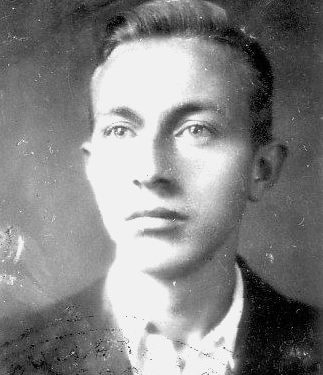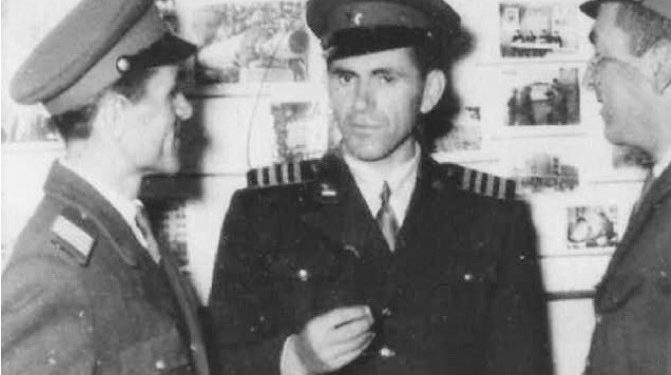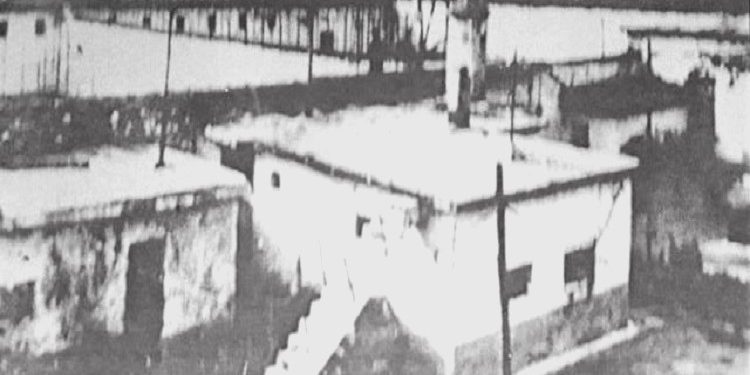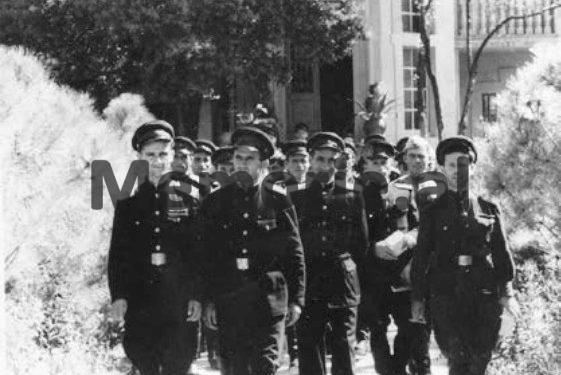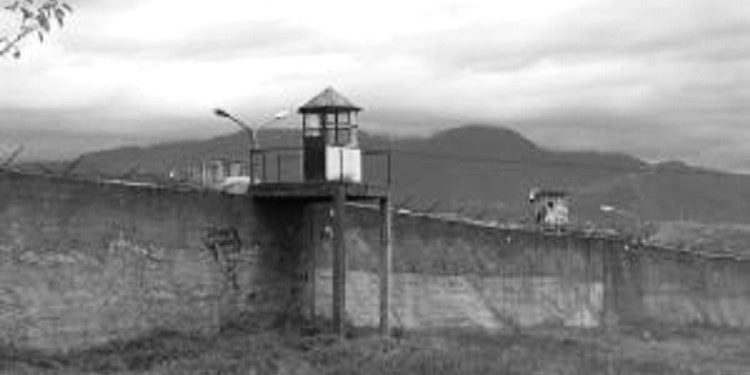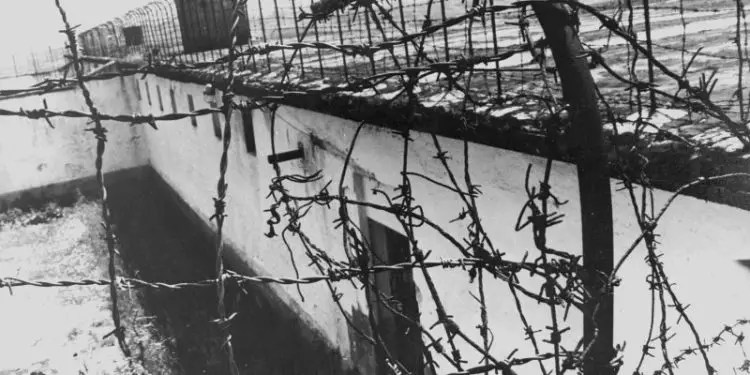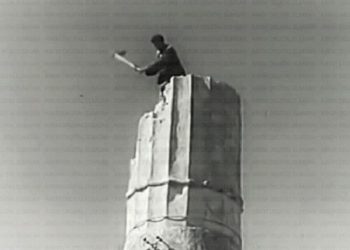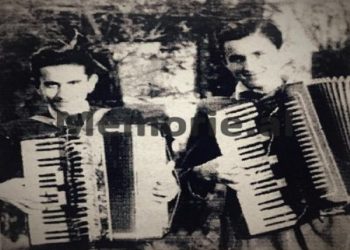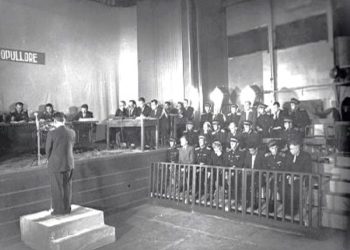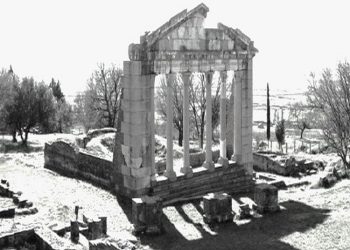By Uran Kalakulla
Part Twenty-Seven
Nazism and Communism
Memorie.al / Nazism lasted 12 years, while Stalinism lasted twice as long. In addition to many common characteristics, there are many differences between them. The hypocrisy and demagogy of Stalinism was of a more subtle nature, which was not based on a program that was openly barbaric, like Hitler’s, but on a socialist, progressive, scientific and popular ideology, in the eyes of the workers; an ideology that was like a convenient and comfortable curtain to lie to the working class, to lull the sharpness of intellectuals and rivals in the struggle for power.
One of the consequences of this peculiarity of Stalinism is that the entire Soviet people, its best, capable, hardworking and honest representatives, suffered the most terrible blow. At least 10-15 million Soviets lost their lives in the torture chambers of the KGB, martyred or executed, as well as in the gulag camps and others like them, camps where it was forbidden to correspond (in fact, they were prototypes of the Nazi death camps); in the mines in the ice of Norilsk and Vorkuta, where people died from cold, hunger, from crushing labor in countless construction sites, in the exploitation of forests, in the opening of canals and during transportation in leaded wagons, or in the flooded barns of the death ships.
Continued from the previous issue
O norm, o soul!
I did not invent this slogan, but I found it in the prison camps where my bad luck befell me; shedding sweat, blood, enduring hardships and suffering, torture and insults, punishments and humiliations, as well as inhuman exploitation to the core. And, of course, like me and other fellow sufferers of my time of imprisonment, years and years, as long as the communist regime ruled with animalistic, criminal cruelty in our unfortunate country.
Today, the materials that argue everything we went through in prisons and prison camps, in places of internment or in the torture cells of the Internal Affairs Branches of the communist state, and even in psychiatric hospitals, have been published in books and archival documents.
I will not repeat what others have written and published before me in books and articles, although they are few, very few to recount the misery that the Albanians suffered from the half-century-long communist cholera. But, I cannot remain without telling and describing as much as I can what I have seen with my own eyes and especially what I have endured myself, during those cruel sufferings. And the Rubik prison camp was one of these places of torture.
The Rubik prison camp had over 400-500 convicts, divided into several brigades. Brigadiers were usually the meanest convicts, who had fallen prey to the Sigurimi and had become spies. So, for this kind of “merit”, they had been given the “high” position of brigadier. It was very rare for a brigadier to be an honest and serious man. Because, as is known, every rule has its exceptions, even if they are rare.
Since our work was construction, everyone might think that this type of work is somewhat easier than reclamation and mining work. Yes, it is undoubtedly so. But in the hands of the communists, especially in prison, no kind of work was easy, even if it was just sweeping the boulevards with a broom. However, I can say that even construction, especially of an industrial work, is full of troubles and hellish hardships, not only in the frost of winter, but also in the scorching heat of peak summer.
It is known that in construction, the first job is excavation. And, in prison, these were done only with hands, with picks and shovels. Because we political prisoners, we cost much, much less than an excavator, a bulldozer and, I don’t know what other kind of machine. Sweat flowed profusely, because in excavation the norm was 12 m. and per person, whether it was a canal or a large foundation pit. If you didn’t do this, hell would take you, since you had the sadistic slogan over your head: “O norm, o soul”!
The foundation and plinth pits would be filled with a grid of iron, just like the vertical columns or the beams and trusses (reinforcements) made of boards. They were also subject to that same slogan, as were the brick walls, the preparation of concrete, any kind of transport of materials, the paving and paving of roads, etc. Even pulling out the nails and straightening them, to put them back to work, had the same slogan above their heads. There was no work or work process in the prison camps of Albania that did not have the aforementioned slogan of Kobzezë above their heads.
With the exception of the half-hour break for breakfast at work, you were not entitled to a single minute of rest during the entire working hours, which were formally October, but often went for 10 or 12 hours a day.
And if the work captain (one in each brigade), saw that you were trying to take a breath, he would grab you, tie you to a post with your hands behind your back, in the winter frost or in the scorching heat of the July sun, and lock you in a dungeon for an entire month. But even this seemed not enough. In the dungeon they would tie you up and kick you, especially when you tried to justify yourself in some way.
Then a bunch of captors would gather around you and kick you until they got tired. However, they would put you in the dungeon for a month, while you were crushed and bleeding. Thus. Working in the communist prison camp was not a pleasure, a joy, but a real torture.
Oh, how many were maimed, even killed by such a cursed job. I can’t count them. Suffice it to say that there is no object built by political prisoners, be it a canal, a building or a mine, that has not had its victims, that does not have in its foundations the contribution and blood of our martyred comrades, from the beginning of the communist regime until its collapse, from the South to the North.
Even today, when I happen to travel by car, sitting comfortably in the seat of a “Benz” bus or car, when I pass by those torturous workplaces (whether canals, mines, residential buildings, stadiums, hospitals, terraces, etc.), a shadow of sadness darkens my soul, when I think of how much sweat and blood from us has been poured into the foundations of those places; when I remember our comrades buried, somewhere around, in lost graves; when I remember those who today languish crippled, when they walk with their backs bent by age and illness, always depressed, badly disappointed even by today’s freedom and democracy.
They have remained poor, forgotten and imagined by society, almost mocked and despised, without any fair and efficient social and state support, much, much lower than the war veterans, among whom our torturers of prisons and prison camps can still roam unpunished, with violence, terror and death. And still, as if the echo of the furious call of the kalsbero resounds in the depths of our souls; “O norm, o spirit”!
Operative
Operatives were State Security cadres who operated directly in the field, among the people, in the city or in the village, throughout the territory of unfortunate Albania. Translated into Albanian, this foreign name means (for those who do not know), simply “active”. But, alas, they were not like that in the economic or cultural fields. They were activists or rather carriers of evil, of tragedy for citizens of every class or category.
They were the messengers of the Lucifer Enver Hoxha, hounds to discover and then catch the victims who ended up in the cannibalistic pit of the dictatorship, a pit that ground people’s lives, with flesh and bone together, like the pit of legends.
There were operatives everywhere: in every workplace, in every neighborhood of the city and village. There were offices, factories, construction sites, schools, artistic collectives, hospitals, agricultural brigades, military units, and even in the police themselves, up to the Internal Affairs organs themselves, where ordinary policemen, their officers and, perhaps, even the Sigurimi employees themselves were spied on and controlled!
Where the kind of craft was like the work of those tiny medical probes, which reach the tissues, veins, and capillaries of the abdomen of living beings, for their screening. The operative had the duty to enter the marital bed, to possibly check the women’s underwear, and so on. Eavesdropping or collecting intercepts, that was the operative’s basic duty.
Thus, everything was eavesdropped and spied on, including the Party itself, the members of the Central Committee, and even those of the Politburo, with one exception, the first secretary of the Central Committee of the Party, Enver Hoxha. Because this was that monstrous being with two heads (or more heads, if you like), like a skunk.
The supreme head of the party, in fact the supreme head of the government, the army, the economy, culture and education, of everything, perhaps not only the world of the dead, although even the dead were not left alone, because they either left them without a grave at all, like the executed and the dead in the inquisition or prisons, or they changed the graves of those who had them, not even leaving their bones alone to decompose as God had ordered. Because, apparently, he called himself God, because he did not even know God himself.
Simply put, for the reasons listed above, as the supreme ruler of everything, living and dead, in that land of 28,000 km., which was called “Socialist Albania”, this supreme head had in his hands the two main components of this kind of terrible state: the Party and the State Security, which, in essence, were two sides of the same coin.
In fact, I would say that it would be more accurate to say that the Party was also commanded by the Sigurimi and Enver Hoxha, never managing to be a little Napoleon, had tried with all his heart and soul to become a Fushe, a figure he had adored all his life.
Anyone who knows the grim figure of Fushe knows that he proved to be very skilled in the escalation of espionage, where each spy had another one behind his back who was tracking him, from beginning to end. Here, this lesson was faithfully implemented by his Albanian student, first adopting Rankovic’s methods, and then Beria’s. But, of course, after having previously implemented Stalin’s.
For the political prisoner (as well as for the internee), the operative was the main enemy, from whom one tried to stay as far away as possible, just as not only a man, but also a wild animal, avoids a snake. Because the operative stayed on the paths of the Albanian world of the communist era, just like disgusting snakes. Of course, like everyone else, I tried to do the same throughout the long period of my imprisonment and internee. After all, as I had done when I was a “free citizen”, before my imprisonment.
In prisons and labor camps, only spies, scum, and half-humans approached the operative, who, unfortunately, distinguished among us the caste that was planted for our own evil. Honest and serious people saw the operative behaving among us in those gloomy environments, with both fear and disgust, with hatred, often gnashing his teeth or clenching his jaws. I did the same.
We were not so afraid of the commanders and commissars of those places of suffering, nor of the policemen who took revenge on us, as we were of the operatives. Because, in fact, they were the ones who made the law. I have witnessed many times when, even a murderous and furious commander, who was not even the commissioner, would calmly appear before the operative, and then this executioner commander would immediately cut off his animalistic horde of animals and remain unmoved, as the tiger and the lion of the jungle remain with their tail in the saddle and retreat before the “Cobra” snake, because, in the end, they retreated before the Sigurimi.
The operative, in prison, first of all had the duty of recruiting spies. And so he was present, just as he was outside the prison. On the one hand, he was the one who recruited spies and on the other hand, he collected information on anyone he wanted, in order to file them and take punishment measures!
New criminal conviction, while still a prisoner, recommendation for internment after leaving prison, punishment in dungeons from time to time, especially in winter when the deepening cold cut you like a razor, transfers from labor camp to prison, especially to Burrel prison, which had the shadow of death, as much as a breach at its door. So, who was the operative: the eye, ear and claw of the State Security everywhere?
Trying to avoid the operative was impossible. Not meeting him was a stroke of luck. Especially for those who were mainly under surveillance or who were of special interest to him. If you had been imprisoned on a purely political charge, having a personality, culture and a past of your own and having some value or importance in prison, you were, without a doubt, the operative’s chosen one. And, thus, the attempt on him was almost inevitable. Here, I too had such an unfortunate fate, like many of my friends.
During my long twenty-one-year imprisonment, I was always under the direct observation of various operatives, as soon as I was released from solitary confinement and taken to the old prison in Tirana. The operative of that prison was called Qorri. He was a weak, yellow-faced, and always gloomy, just like an emissary of death. I never heard his voice, because, thank God, I was lucky enough to never meet him, although with him, in addition to that prison, I also happened to be in two labor camps in a row: in Tirana and in Rubik.
He never called me, when he happened to pass by where I was. He only gave me a fixed, inquisitive and always frowning look. And I almost felt goosebumps, as if in those moments (even in the middle of the heat), the piercing depth of winter or the very shadow of death it had passed by me.
The second operative from Rubik’s camp, Qorri’s replacement. His name was Sabri Meta. He was from Shëngjergji in Tirana and had been a welder, a communist of course, he had attended the Party School and had been made an operative and had been brought there to us at the feet of Qorri, who, as they said, had been released.
Sabri had an average build: stout, with a physique almost that of an athlete or a wrestler. If he caught you with his hand, he could easily break your bones, without having to seek the help of the policemen around him. Unlike Qorri, who was sullen and pale, he was in perfect health and did not look sullen: In fact, I had seen him squirming quite a few times.
His speech was that of the Tirana district, which I, as a former teacher, knew well, just as I knew the psychology of the villagers and mountaineers of that area. Unlike Qorri, who rarely entered prison or the camp, you had Sabriu almost constantly on your feet, like an annoying wasp, in the work facilities or in the sleeping bunkers, wandering around everywhere and, like a police dog, sniffing every nook and cranny.
One day, I went to the “culture hall” of the Rubik prison camp, where we had been taken to build the Copper Refining Plant. In almost every prison camp of that time, in addition to the dungeons, the ministry had ordered the creation of “libraries” or “culture rooms”, where the convicts, in their free time, after working hours, could go and read party books or socialist realism literature, in order to “re-educate themselves”. Demagoguery and hypocrisy went hand in hand with physical and spiritual violence.
This type of “re-education” was dealt with in particular by the commissar, who had the duty to hold conferences from time to time to make the “party line” clear to us. So, to educate us so that we, from enemies, would transform into “friends” of the “party and the people’s power” by certainly completing the years of punishment, to give our souls by working and to show with facts that we had already repented for the “serious crimes and sins” that we had committed and that our hearts were burning, to enter the “warm bosom of mother Party”!
But, on this path of “rehabilitation”, above all, it was worth becoming a spy for your comrades and (of course), a servant of the command or, more precisely, of the operative. Moreover, this work was the pinnacle of devotion, the first and greatest proof of loyalty above all others.
Because, you could go regularly to the “culture hall”, read all the Party books, with preference of course the “works” of comrade Enver, you could discuss the commander’s line in his meetings, you could even give your soul to work, but if you did not cooperate with the operative, to make the grave of your fellow sufferers, you had not done anything yet. Everything else was multiplied by zero! So, “re-education” meant, more precisely, “espionage”.
For your diligence in this field, the commissar or the operative could appoint you as an employee, no longer at the physical work site, a simple worker with a pickaxe and a shovel, but a member of the “rear”, meaning you no longer went out to the work site, but stayed inside the camp, where we lived or: a bunker guard, cleaner, cook, nurse, command shoemaker (not for prisoners), carpenter or tailor (always for command), barber (this time for convicts), and especially a herald (the one who announced the orders of the guard officer, as loud as his voice could take), who was also the operative’s herald (this time in a low voice in the latter’s ear). Thus, the heralds were the “official” servants of the command and nothing less!
A privileged “profession” was that of the tireless work of the “librarian” or the person in charge of the so-called “culture hall”. This “culture hall” in the Rubikut prison camp, in addition to bookshelves, there were also tables and benches where he could sit and read his “works” or write letters to his family. (Once a month, as they had a “ration”, a single page of a notebook, from those from elementary school).
And I, after work hours, after eating the piece of bread and the ladles with langur that was served to us, would often go to this “library”, take one of the books by Marx and Engels (not the others) and with them as a “shield” in front, I would deal with my writings.
On one of these days, along with me, a prisoner from Durrës, a strong man, who had come to that prison camp from the Burrel prison, sat at the other table. He had put one of Mao’s thick volumes (newly translated into Albanian) in front of his eyes and was deeply immersed in them. And I had Engels’ “Anti-Dühring”. But while he was reading, I was writing something of my own. Memorie.al




